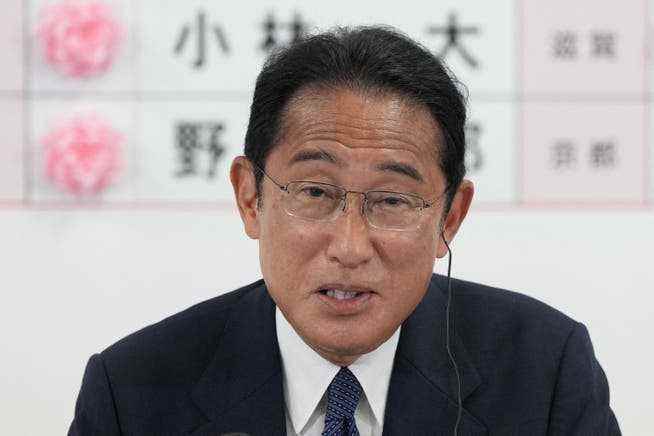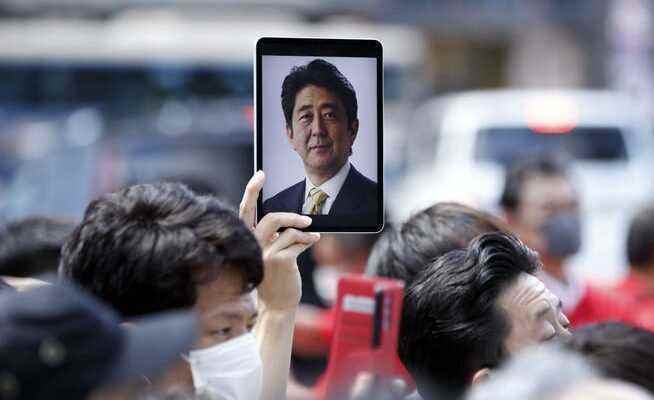Even before the deadly assassination attempt on Japan’s ex-Prime Minister Abe, the ruling LDP’s chances of election were good. Now the governing coalition has been given the mandate to govern. Maybe she can even achieve Abe’s goal in life: a constitutional amendment.
The violent death of Shinzo Abe, one of Japan’s most influential politicians, has had a major impact on the outcome of the upper house election.
Japan’s former Prime Minister Shinzo Abe was shot dead while delivering a campaign speech on Friday. On Sunday, his conservative Liberal Democratic Party (LDP) won a major victory in Japan’s upper house election. According to the first projection of the TV channel NHK, which was confirmed more and more during the course of the evening, the LDP alone can win more than half of the 125 seats that will be awarded in the partial election of the upper house. Half of the House of Lords, which has now been expanded to 248 seats, is re-elected every three years. Together with the small partner New Justice Party, the coalition can thus expand its absolute majority in the upper chamber. The House of Lords must approve decisions made by the ruling House of Commons.
Many pundits had expected that Abe’s assassination would further increase the LDP’s electoral chances. Because Abe was not just any head of government, but the architect of today’s Japan. This strong election victory by Fumio Kishida even allows the current prime minister to govern many urgent economic, monetary and domestic policy issues. The largest opposition party, the left-centrist Constitutional Democratic Party, and other left-wing parties lost further mandates at the same time.
An important victory for Prime Minister Kishida
There will be no elections for the next three years. On the evening of the election, Kishida said what he wanted to focus on: the corona pandemic, the situation in Ukraine, rising prices and the revival of the economy. On the last point, Kishida can try with his majority what he has not been able to do so far: to fill his slogan of a “new capitalism” that will increase the falling real incomes of Japan’s workers with concrete measures. The previous program, which the government passed in early June, still shied away from demands that might alienate the corporate world or the strong national-conservative wing around Abe. Disappointed reformers were then told: “Wait until after the election.”

Prime Minister Fumio Kishida emerges strengthened from the upper house election.
In terms of monetary policy, too, Kishida now has it in his hands to set his own economic policy signals. Abe’s chosen Fed Governor Haruhiko Kuroda, who has been behind the Bank of Japan’s massive purchases of government bonds and rock-bottom interest rates since 2013, must be replaced in 2023. But in Japan there is growing criticism of his policy of sticking to Japan’s policy of keeping interest rates low, despite inflation, a massive depreciation of the yen and global interest rate hikes.
Posthumously, Abe faces the fulfillment of his life goal
Above all, however, the LDP now has the chance to carry out Abe’s actual political mission posthumously. During his lifetime, Japan’s longest-serving Prime Minister wanted to push through the project that his grandfather Nobusuke Kishi had failed to implement as head of government: a revision of the constitution written in 1947 by the American occupying forces. Many in the conservative camp see them as imposed. On Sunday, voters gave the coalition and two other supporters of a constitutional amendment a clear two-thirds majority in the upper house. This is necessary in both the lower and upper houses in order to submit proposed amendments for a referendum.
The focus of the constitutional reformers is to change the pacifist Article 9 so that Japan’s “self-defense forces” are upgraded to a real army. This would be an important step in expanding Japan’s role in the military alliance with the US regionally. Until now, the constitution has prohibited the country from possessing war potential. The military is therefore called “self-defense forces” and for a long time limited itself exclusively to its own national defense.
Abe expanded the field of application by reinterpreting the constitution, but repeatedly encountered constitutional and political resistance. However, with the growing fear of an expansive China, the mood is changing. In surveys, a majority of respondents are already in favor of raising the defense budget well above the previous one percent of gross domestic product. Under pressure from the Abe wing, the LDP is even aiming for a doubling of economic power to two percent.
To do this, however, the LDP must join forces with Sunday’s second election winner, who could become a threat to the LDP in the long term or could become a new coalition partner: the right-wing populist Japan Renewal Party. It is currently expanding nationwide from its regional center in Osaka and will definitely gain seats in the upper house as well. According to previous projections, it could even become the third strongest force after the Democrats. It is thus increasingly developing into an alternative for the large camp of resigned people who have not voted for years. Even in general elections, turnout has been well below 60 percent for years.
The motive for the assassination: personal resentment against a religious group
In the upper house election, there were probably even fewer. Japan’s politicians had turned the deadly assassination attempt on the former head of government into a demonstration for democracy. Most politicians only briefly suspended their campaign for the upper house election on Friday. On Saturday everyone was back on the streets, even Prime Minister Fumio Kishida. In the final sprint before the election, he trundled through the country with increased certainty. And everywhere he called out to voters a message that almost every politician from left to right had included in his speech in a similar way: “We must show emphatically that our democracy and our elections cannot be defeated by violence.”
However, the information available so far about the perpetrator’s motive does not indicate a political background at all, but rather personal annoyance. 41-year-old Tetsuya Yamagami, an unemployed former Marine, said investigators said it was not about political beliefs. “I had a grudge against a certain religious organization and I thought the group was linked to former Prime Minister Abe.” His mother donated a lot of money to this group, he explained. This broke up the family. Yamagami therefore made an improvised shotgun and even explosive devices at home. Instead of using it against the group’s distant boss, as originally planned, he used it against a closer target: using a double-barrelled gun taped together, he shot Abe not far from his home in the city of Nara.
Did the assassin act out of hatred for the Moon cult?
Investigators are still hiding the name of the religious group. But Japanese and foreign media have confirmed that it is the Korean-born Unification Church — also known as the Moon sect — a Christian cult with hard sell tactics and staunchly anti-Communist stances. Abe’s grandfather Kishi became friends with founder Moon Sun Myung in the 1960s. The first Japanese headquarters of the so-called “Moonies” is said to have been built on a property owned by the Kishi family. The good relations are said to have protected the cult from investigations into the sales practices.
Abe inherited this good relationship with the organization. The left in Japan suspects that the name of the organization was not given so that the Moon sect’s ties to Abe would not be openly reported ahead of the election. Koichi Nakano, a political scientist at Tokyo’s Sophia University, says: “If you admit that this is the Unification Church, you have to mention the political ties between the Unification Church and the right wing of the LDP, including Abe.” That would be uncomfortable for the LDP and the media.
